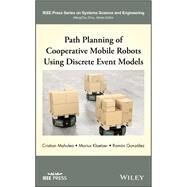Path Planning of Cooperative Mobile Robots Using Discrete Event Models
, by Mahulea, Cristian; Kloetzer, Marius; Gonzalez, Ramon- ISBN: 9781119486329 | 1119486327
- Cover: Hardcover
- Copyright: 1/9/2020
Offers an integrated presentation for path planning and motion control of cooperative mobile robots using discrete-event system principles
Generating feasible paths or routes between a given starting position and a goal or target position—while avoiding obstacles—is a common issue for all mobile robots. This book formulates the problem of path planning of cooperative mobile robots by using the paradigm of discrete-event systems. It presents everything readers need to know about discrete event system models—mainly Finite State Automata (FSA) and Petri Nets (PN)—and methods for centralized path planning and control of teams of identical mobile robots.
Path Planning of Cooperative Mobile Robots Using Discrete Event Models begins with a brief definition of the Path Planning and Motion Control problems and their state of the art. It then presents different types of discrete models such as FSA and PNs. The RMTool MATLAB toolbox is described thereafter, for readers who will need it to provide numerical experiments in the last section. The book also discusses cell decomposition approaches and shows how the divided environment can be translated into an FSA by assigning to each cell a discrete state, while the adjacent relation together with the robot's dynamics implies the discrete transitions.
Highlighting the benefits of Boolean Logic, Linear Temporal Logic, cell decomposition, Finite State Automata modeling, and Petri Nets, this book also:
- Synthesizes automatic strategies based on Discrete Event Systems (DES) for path planning and motion control and offers software implementations for the involved algorithms
- Provides a tutorial for motion planning introductory courses or related simulation-based projects using a MATLAB package called RMTool (Robot Motion Toolbox)
- Includes simulations for problems solved by methodologies presented in the book
Path Planning of Cooperative Mobile Robots Using Discrete Event Models is an ideal book for undergraduate and graduate students and college and university professors in the areas of robotics, artificial intelligence, systems modeling, and autonomous control.







